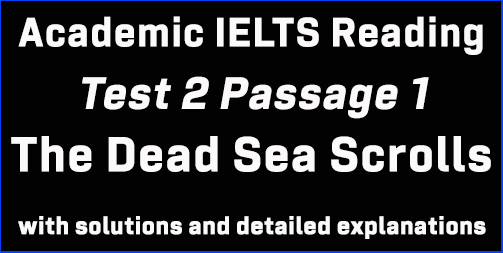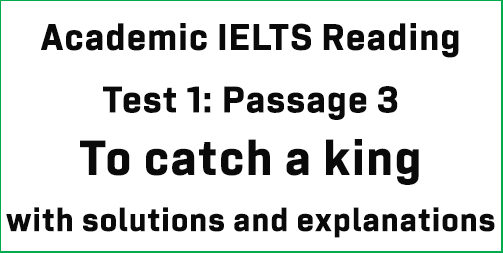IELTS Academic Reading: Cambridge 4 Test 3 Reading passage 1; Micro-Enterprise Credit for Street Youth; with best solutions and best explanations
This Academic IELTS Reading post focuses on solutions to IELTS Cambridge 4 Reading Test 3 Reading Passage 1 which is titled ‘Micro-Enterprise Credit for Street Youth’. This is a targeted post for IELTS candidates who have big problems finding out and understanding Reading Answers in the AC module. This post can guide you the best to understand every Reading answer without much trouble. Finding out IELTS Reading answers is a steady process, and this post will assist you in this respect.
IELTS Cambridge 4 Test 3: AC Reading Module
Reading Passage 1: Questions 1-13
Title of the passage: Micro-Enterprise Credit for Street Youth
Questions 1-4: Multiple choice questions
[This type of question asks you to choose a suitable answer from the options using the knowledge you gained from the passage. Generally, this question is set found as the last question set in most passages so you should not worry much about it. Finding all the answers to previous questions gives you a good idea about these questions.]
Question no. 1: The quotations in the box at the beginning of the article
Keywords for the question: quotations in the box, beginning of the article,
Let’s take a look at the first quotation in the box at the beginning of the article.
“I am from a large, poor family and for many years we have done without breakfast. Ever since I joined the Street Kids International program I have been able to buy my family sugar and buns for breakfast. I have also bought myself decent second-hand clothes and shoes.” – Doreen Soko
Here, Doreen Soko, a Participant in the Youth Skills Enterprise Initiative Program in Zambia, expresses his/her opinion that the S.K.I. program has helped his/her family to survive by fulfilling the basic human rights.
Let’s take a look at the second quotation now.
‘We’ve had business experience. Now I’m confident to expand what we’ve been doing.
I’ve learnt cash management, and the way of keeping money so we save for re-investment. Now business is a part of our lives. As well, we didn’t know each other before – now we’ve made new friends.’ – Fan Kaoma
Here, another participant, Fan Kaoma, says that she got training about expanding her business and cash management from S.K.I.
Therefore, these two quotations are examples of the effects of S.K.I.
So, the answer is: A (exemplify the effects of S.K.I.)
Question no. 2: The main purpose of S.K.I. is to
Keywords for the question: main purpose, S.K.I.,
In the ‘Introduction’ section, the writer mentions in the first paragraph, “Although small-scale business training and credit programs have become more common throughout the world, relatively little attention has been paid to the need to direct such opportunities to young people. .. .”
Then, in the second paragraph, the author writes, “Over the past nine years, Street Kids International (S.K.I.) has been working with partner organisations in Africa, Latin America and India to support the economic lives of street children. .. .”
Here, small-scale business training and credit programs = business training and loans,
to support the economic lives of street children = to provide support by giving business training and loans,
So, the answer is: D (give business training and loans to street children.)
Question no. 3: Which of the following is mentioned by the writer as a reason why children end up living on the streets?
Keywords for the question: reason, children, end up, living, on the streets,
In the ‘Background’ section, the writer mentions in the first paragraph, “Typically, children do not end up on the streets due to a single cause, but to a combination of factors: a dearth of adequately funded schools, the demand for income at home, family breakdown and violence.
Here, a dearth of adequately funded schools = poverty,
So, the answer is: C (poverty)
Question no. 4: In order to become more independent, street children may
Keywords for the question: to become more independent, street children, may,
In the ‘Background’ section, the writer mentions in the last lines of second paragraph, “ . .. . . Many children may choose entrepreneurship because it allows them a degree of independence, is less exploitative than many forms of paid employment, and is flexible enough to allow them to participate in other activities such as education and domestic tasks.”
Here, may choose entrepreneurship = may set up their own businesses,
So, the answer is: C (set up their own businesses.)
Question 5-9: Completing table: NO MORE THAN THREE WORDS
[In this type of question candidates need to fill in the gaps in a table with NO MORE THAN THREE WORDS. Skimming and scanning, both reading skills are essential for this question-type.]
Question no. 5 & 6:
| Country | Organisations
Involved |
Type of Project | Support Provided |
| 5. __________ and __________ | • S.K.I. | courier service | • provision of 6. ________ |
Keywords for the question: S.K.I., courier service, provision of,
In the ‘Street Business Partnerships’ section, the writer mentions in the first bullet point,
- The S.K.I. Bicycle Courier Service first started in Sudan. Participants in this enterprise were supplied with bicycles, which they used to deliver parcels and messages, and which they were required to pay for gradually from their wages. A similar program was taken up in Bangalore, India.
Here, similar program = Courier Service, this enterprise were supplied with = support provided with provision of,
So, the answers are:
- Sudan, India (in any order)
- bicycles
Question no. 7:
| Country | Organisations
Involved |
Type of Project | Support Provided |
| Dominican
Republic |
• S.K.I.
• Y.W.C.A. |
7. __________ | • loans
• storage facilities • savings plans |
Keywords for the question: Dominican Republic, S.K.I., Y.W.C.A., loans, storage facilities, savings plans,
In the ‘Street Business Partnerships’ section, the writer mentions in the second bullet point,
- Another successful project, The Shoe Shine Collective, was a partnership program with the W.C.A. in the Dominican Republic. In this project, participants were lent money to purchase shoe shine boxes. They were also given a safe place to store their equipment, and facilities for individual savings plans.
Here, lent money = loans, a safe place to store their equipment = storage facilities, facilities for individual savings plans = savings plans,
So, the answer is: Shoe Shine (Collective)
Question no. 8:
| Country | Organisations
Involved |
Type of Project | Support Provided |
| Zambia | • S.K.I.
• The Red Cross • Y.W.C.A. |
setting up small businesses | • business training
• 8. ______ training • access to credit |
Keywords for the question: Zambia, S.K.I, The Red Cross, Y.W.C.A., setting up small businesses, business training, access to credit,
In the ‘Street Business Partnerships’ section, the writer mentions in the third bullet point,
- The Youth Skills Enterprise Initiative in Zambia is a joint program with the Red Cross Society and the W.C.A. Street youths are supported to start their own small business through business training, life skills training and access to credit.
Here, start their own small business = setting up small businesses,
So, the answer is: life skills
Questions 9-12: YES, NO, NOT GIVEN:
[In this type of question, candidates are asked to find out whether:
The statement in the question matches with the claim of the writer in the text- YES
The statement in the question contradicts with the claim of the writer in the text- NO
The statement in the question has no clear connection with the account in the text- NOT GIVEN]
[TIPS: For this type of question, you can divide each statement into three independent pieces and make your way through with the answer.]
Question no. 9: Any street child can set up their own small business if given enough support.
Keywords for the question: any street child, can set up, own small business, if given, enough support,
In the ‘Lessons learned’ section, the writer mentions at the beginning of the first bullet point,
- Being an entrepreneur is not for everyone, nor for every street child.
Therefore, the line contradicts the question directly.
So, the answer is: NO
Question no. 10: In some cases, the families of street children may need financial support from S.K.I.
Keywords for the question: some cases, families of street children, may need, financial support, from S.K.I.,
The passage does not provide any information regarding supporting the families of street children financially from S.K.I.
So, the answer is: NOT GIVEN
Question no. 11: Only one fixed loan should be given to each child.
Keywords for the question: only one fixed loan, should be given, to each child,
At the beginning of bullet point no. 5 in the ‘Lessons learned’ section, the author points out,
- Small loans are provided initially for purchasing fixed assets such as bicycles, shoe shine kits and basic building materials for a market stall.
Here, Small loans = more than one loan,
So, the answer is: NO
Question no. 12: The children have to pay back slightly more money than they borrowed.
Keywords for the question: children, have to pay back, slightly, more money, than they borrowed,
In the final bullet point of the ‘Lessons learned’ section, the writer says,
- All S.K.I. programs have charged interest on the loans, primarily to get the entrepreneurs used to the concept of paying interest on borrowed money.
Here, interest on the loans / paying interest on borrowed money = pay back slightly more money than they borrowed,
So, the answer is: YES
Question no. 13: Multiple choice questions
[This type of question asks you to choose a suitable answer from the options using the knowledge you gained from the passage. Generally, this question is set found as the last question set in most passages so you should not worry much about it. Finding all the answers to previous questions gives you a good idea about these questions.]
Question no. 13: The writers conclude that money should only be lent to street children.
Keywords for the question: conclude, money, should only be lent to, street children,
The answer lies in the ‘Conclusion’ section, in the very last lines, “ .. . . we believe that credit must be extended in association with other types of support that help participants develop critical life skills as well as productive businesses.”
Here, in association with other types of support that help participants = as part of a wider program of aid,
So, the answer is: A (as part of a wider program of aid.)
Click here for solutions to Cambridge 4 Test 3 Reading Passage 2
Click here for solutions to Cambridge 4 Test 3 Reading Passage 3




The best useful site I have ever seen!